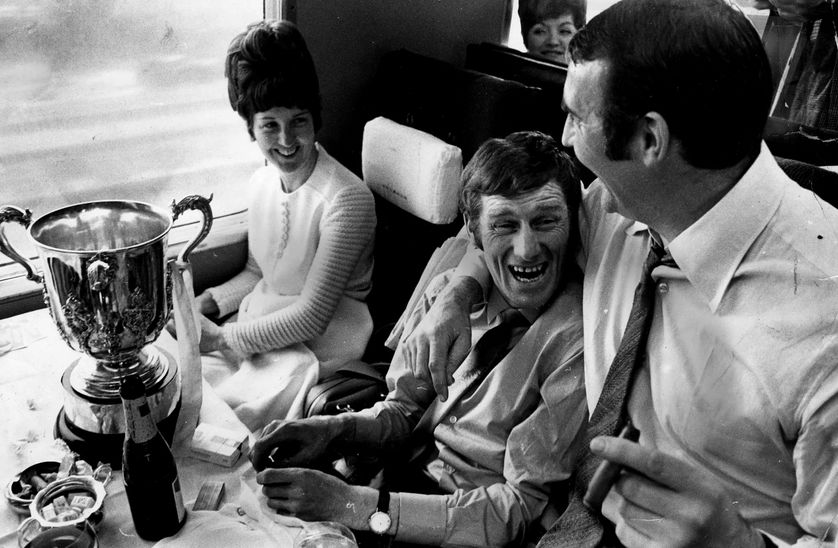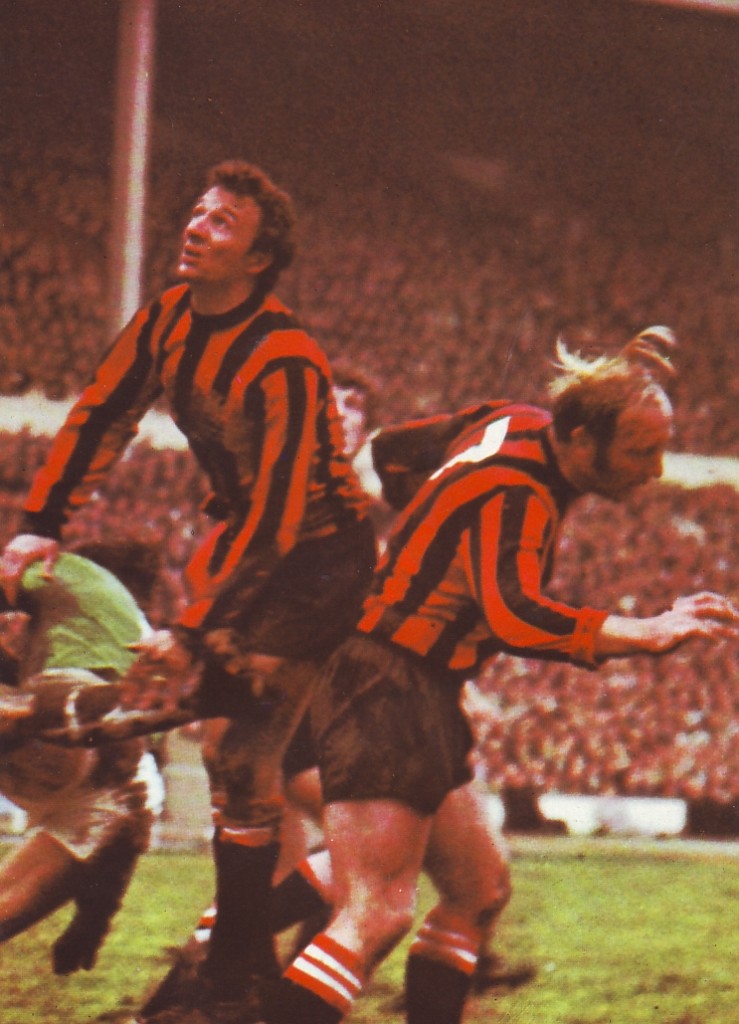

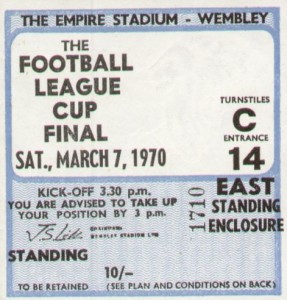
CITY 2 WEST BROMWICH ALBION 1
League Cup Final
at Wembley
7th March 1970
Attendance 97,963
scorers
CityDoyle(58), Pardoe(102)
West Brom Astle(6)
Ref V James
City Corrigan, Book, Mann, Doyle, Booth, Oakes, Heslop, Bell, Summerbee, Lee, Pardoe – sub Bowyer(70)
West Brom Osborne, Fraser, Wilson, Brown, Talbut, Kaye, Cantello, Suggett, Astle, Hartford, Hope – sub Krzywicki(84)
A great article from the TV Times, the week before the final
ARTICLE FROM CITY PROGRAMME 7TH MAY 2013 BY DAVID CLAYTON
Probably the most high profile game between City and West Bromwich Albion was our first ever League Cup Final win back in 1970. Memorably it was played on a muddy snowy Wembley surface famously described by Blues’ manager Joe Mercer as “a pig of a pitch”. It was a long way short of the bowling green surface everyone had come to expect of England’s home stadium but it was hardly surprising given that The Horse Of The Year Show had been held at Wembley just days earlier, an unthinkable scenario in today’s world where perfection is demanded from players, sponsors and a global audience of millions.
However despite the condition and wintry weather, referee James passed the game fit to play. Fans of both teams had earlier volunteered to help clear the snow and probably saved the match from postponement.
This was to be a gruelling game for City, not only because West Brom were a good side who had recorded a 3-0 win at The Hawthorns over The Blues just five weeks, but because of the circumstances surrounding the run up to the final.
Three days earlier City had ground out a 0-0 draw in the European Cup Winners Cup quarter final away to Portuguese outfit Academica Coimbre, it had been a draining 90 minutes against a hard working young team and the journey home had been long and tiring with thick fog meaning the team’s flight had to divert from London to The Midlands and make the rest of the journey by coach. For the players, it seemed events were conspiring against them as they started their bid for a third major trophy in three years… Neil Young was a notable absentee from the team that ran out to face The Baggies and Arthur Mann was handed a rare start as a result with Glynn Pardoe pushing into midfield.
City, playing in their famous red and black striped kit, were soon on the rack and fell behind to a Jeff Astle header on six minutes after Joe Corrigan and George Heslop got in each other’s way. But the goal only served to be the wake-up call The Blues needed. Slowly City began to stifle Albion with Heslop and Booth giving little away at the back and the inspirational Alan Oakes and Mike Doyle surging forward at every opportunity.Try as they might, however, there would be no further scoring in the first half.
Albion’s Colin Suggett broke clear shortly after the break and could have all-but sealed victory, but he made a hash of the chance and was left to rue what might have been.
Soon after, City punished that miss after winning a corner on the hour mark. Mike Summerbee flicked on the corner to Colin Bell who cushioned a header into Mike Doyle’s path, Doyle’s first-time shot beat Osborne and City at last were level.
The question was, with the pitch sapping energy from the players as the game wore on, did The Blues have enough gas to see the task through?
It was now anybody’s game and City’s quest was about to get even harder as Summerbee had to be substituted after sustaining a hairline fracture of his leg. No Young and no Summerbee, the balance seemed to be tipping back towards West Brom.
Asa Hartford, who was then playing for West Brom, was substituted late in normal time and his replacement, Dick Krzywicki used his pace to almost grab a winner for the Midlands outfit and then Franny Lee went close for City, but it wasn’t to be and the game went into extra time, the last thing Mercer’s men needed.
With the watching nation now expecting the fresher West Brom to finish the job off, the exhausted Blues somehow conjured up what proved to be a 102nd minute winner.
Lee chipped a ball to Bell in the box and his back heel fell perfectly for Pardoe. He looked up, shot and squeezed a drive past the Baggies keeper from the corner of the box to send the traveling Mancunians wild.
There were no further goals and Tony Book lifted the trophy for the first time in City’s history.
It was the first time The League Cup had come to the North West and, more significantly, it was the first time the entire 92 clubs of the Football League had taken part. Less than two months later City added the European Cup Winners Cup to the Maine Road trophy cabinet to complete a memorable period of success for the club.
ADAPTED FROM MY DREAM GAME – GLYN PARDOE BY PETER GARDNER CITY PROGRAMME 6TH DEC 1975 Glyn looks to the 1970 League Cup Final as his most memorable moment in football.
“I’ve got to go for that game for no other reason than that I scored the winning goal at Wembley. What more can a player ask for? It is a once in a lifetime achievement.
“I had been to Wembley before, playing in the City side that won the F.A. Cup the previous year, but even that occasion was overshadowed the moment I scored the winner against West Brom.
“I can recall the move to this day. Franny Lee went down the wing on the right, chipped the ball over to the far post and Colin Bell flicked it on to me as I came running in behind him.
“That came in extra time of a truly magnificent game made all the more remarkable because of the events leading up to it. Earlier that week we were in the sun of Portugal for a European Cup Winners’ Cup tie playing on a bone ,hard ground and earning a goaless draw against Academica Coimbra.
“Three days later we were snowed up in England and ready to play on a mud-bound pitch-the worst condition I have ever seen Wembley in.
“Look, too, at the fact that at midnight on the Thursday we were having a meal in a motorway cafe and you can realise that our build up for a vital cup final was extreme to say the least.
“Yet we went out on the Saturday and played some superb football. It is a League Cup game that is the best on record when everything is considered. Despite losing that early goal when Jeff Astle scored after just five minutes, we ran Albion off the park.
“It was a strange looking formation we fielded without recognised wingers, but the outcome was never a dull, negative match. We hit West Brom with everything we had from the moment they went ahead and I ask you, how could any team survive under such punishment?”
JEFF ASTLE PUTS WEST BROM IN FRONT
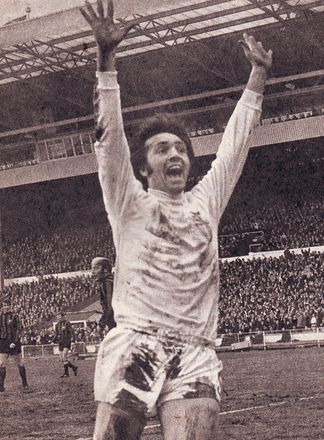
MIKE DOYLE SCORES THE EQUALISER

Taken from ‘Alan Oakes My Dream Game an article written by Peter Gardner, Published in the City home programme 24th September 1975 – Alan Oakes recalls: “The week of the League Cup Final coincided with the quarter-finals of the Cup Winners’ Cup and we had to go to Portugal to play the first leg against Academica Coimbra. It meant there was no chance of us getting a touch of the Wembley wobbles because there was no time to think of the final until it was right on top of us. We were in Portugal on Tuesday, played the match on Wednesday and then had to travel back to London on virtually all day Thursday so it was Friday before we were really able to get our breath back and start thinking about West Brom.
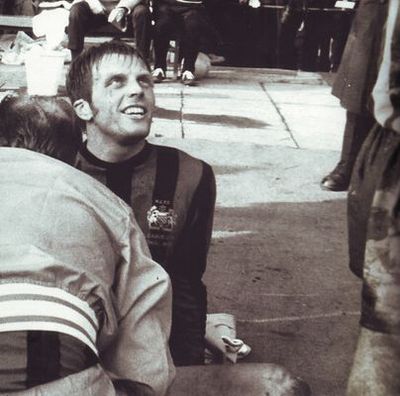
“Yet on reflection it was perhaps a great way to prepare for a Cup Final. The game in Portugal occupied the early part of the week and the fact that we held Coimbra to a goaless draw with the second leg to come at Maine Road left us all in high spirits. At that time Joe Mercer told me: “We have proved again that the British footballer must be the most adaptable of all. One day we are basking in the sunshine of Portugal, the next we are back in the Siberian climate of England. Then in the mudbath of Wembley we become League Cup Winners.”
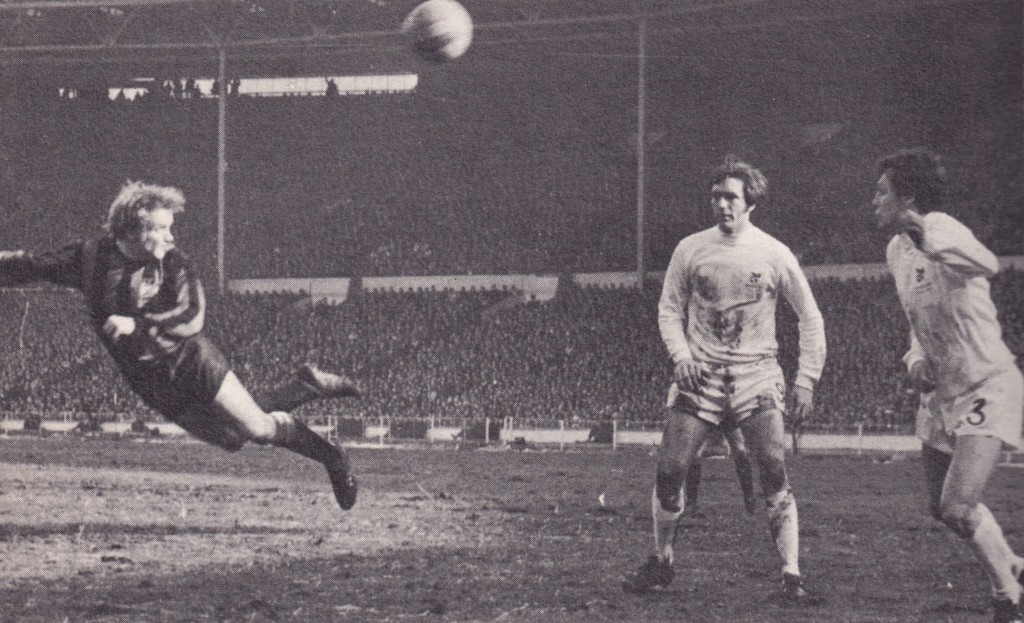
It was an understatement by Mercer, who described Wembley that day as “a pig of a pitch.” Says Oakes: “It wasn’t in very good shape to say the least, but we lasted the pace better than Albion and deserved victory on the day. Yet we didn’t get off to a very good start. “As early as the sixth minute Jeff Astle headed Albion ahead. However, we pulled ourselves together, realising we still had almost the entire game in which to fight back. From that point Astle rarely got another kick thanks to the firm grip George Heslop kept on him. In fact that was the turning point of the game. Perhaps it was the best
thing that could have happened to us.”
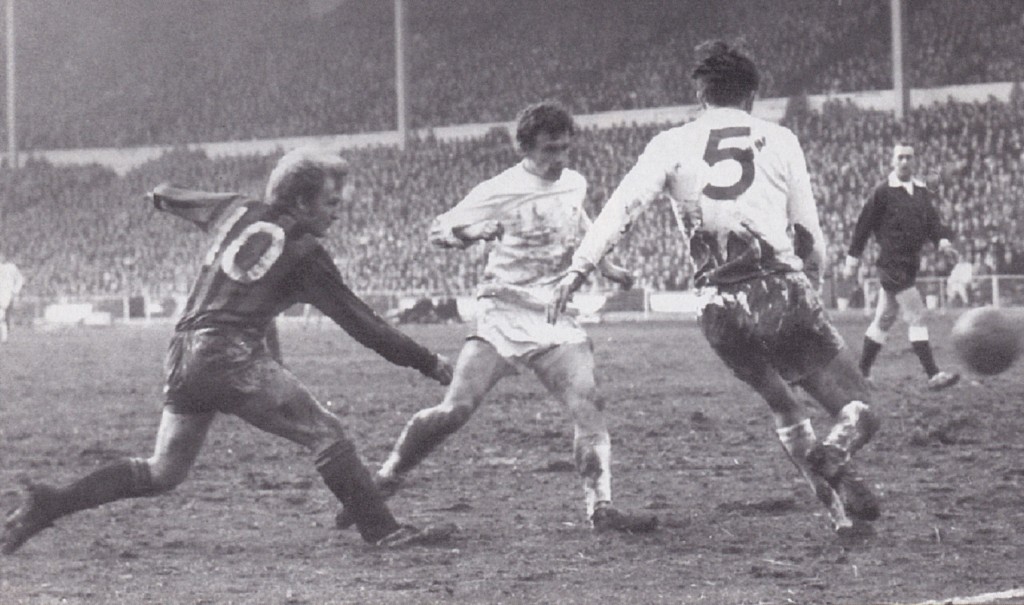
Oakes and Mike Doyle were brilliant in mastering the midfield, forcing Albion to constantly backpedal. Says Oakes: “A goal just had to come for us such was the cracking pace we were setting. And it did when Mike Summerbee, who was later found to have a hairline fracture of his left leg, flicked on a right wing corner from Glyn Pardoe.
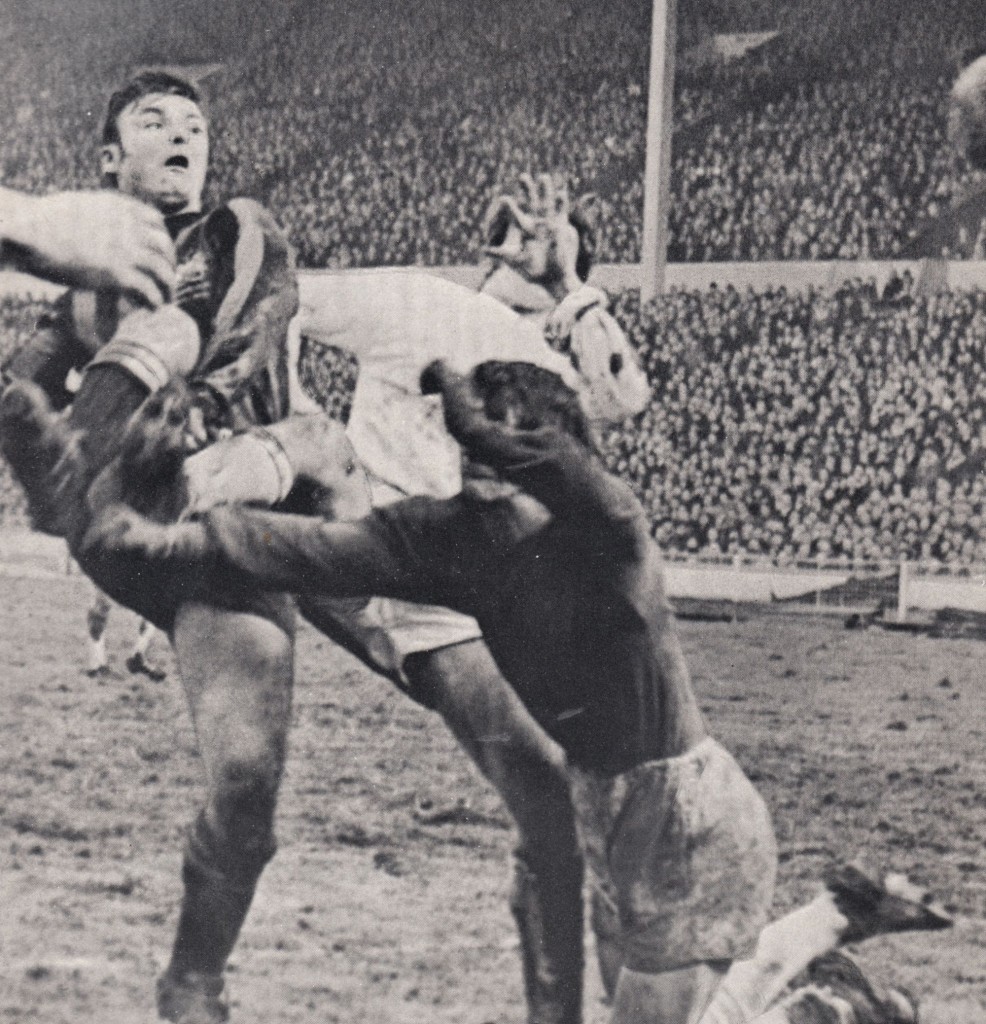
“Colin Bell headed the ball across to Mike Doyle who was unmarked and he scored with a terrific first-time effort. “We were right back in the game, although the punishing pace was beginning to tell on us all. However, it became clear that the longer the game lasted, the more chance we had of winning.”
How right was Oakes who challenged Francis Lee as City’s man-of-the-match as the Blues clinched a fantastic hat-trick of domestic trophies – League title in 1968, FA Cup 1969 and League Cup 1970.
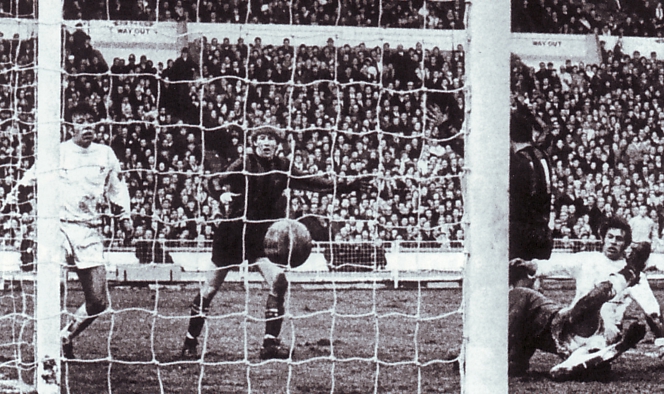
Glyn Pardoe clinched victory that cold March afternoon in the 101st minute after the deadly Lee had chipped the ball to Bell, whose back-header fell perfect for Pardoe to coolly execute Albion with a truly killer goal. Says Oakes: “That for me was my dream match. I had been to Wembley the previous year, but going there a second time in the circumstances we did gave everyone that extra slice of satisfaction.”
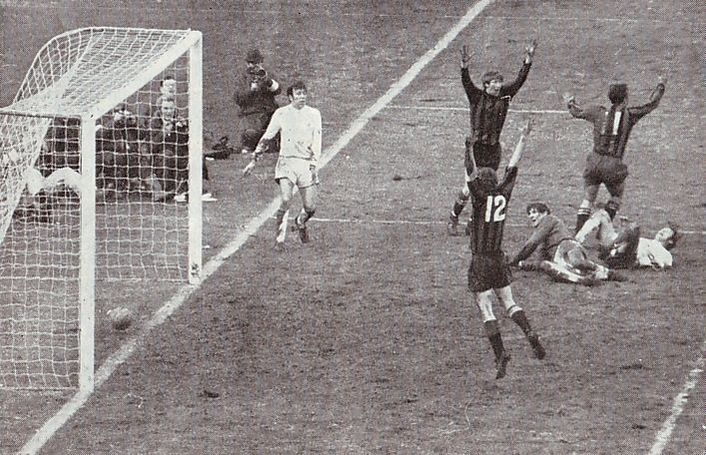
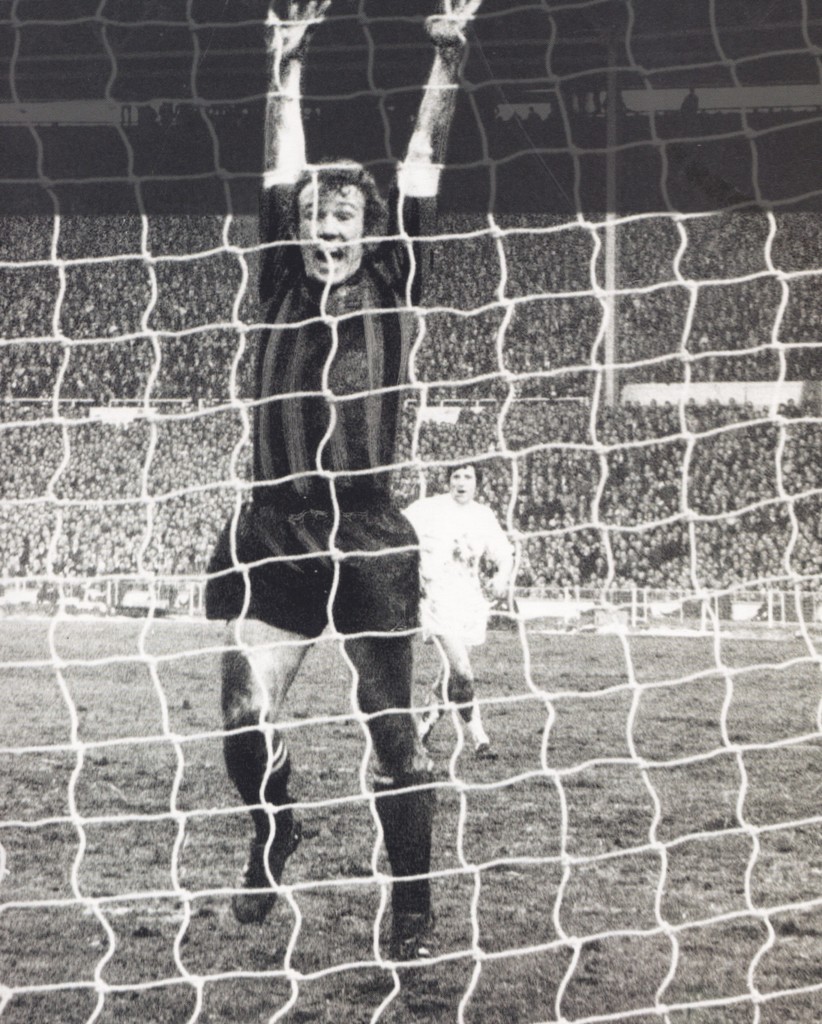
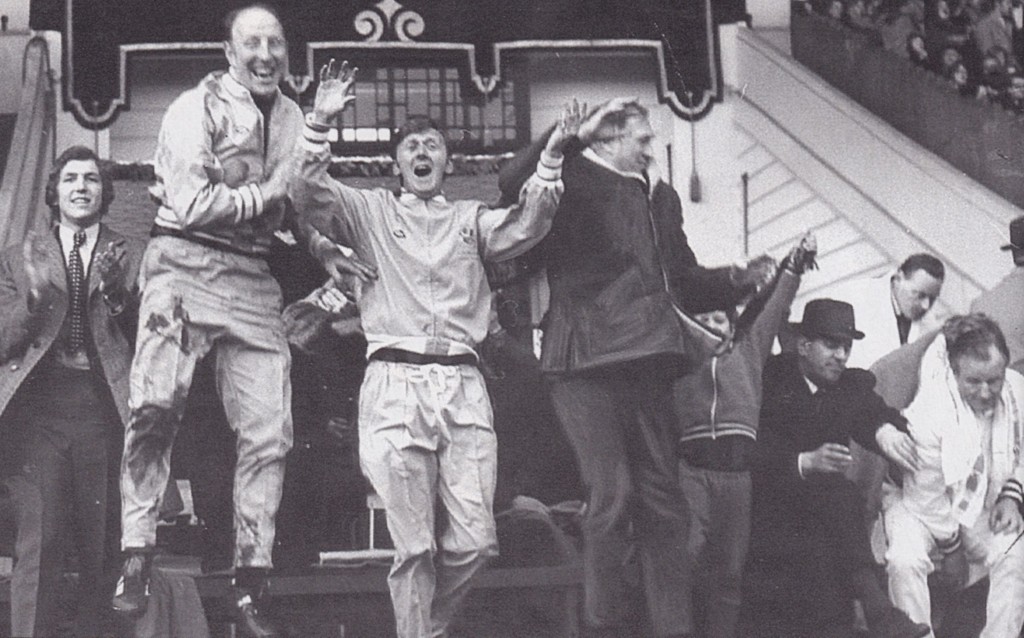
FROM THE JOE CORRIGAN STORY…As we got off the coach Malcolm took me to one side and said he wanted a word. “What have I done now?” I asked, fearing the worst.
As the other lads made their way to the changing rooms Malcolm said “That’s the tunnel go out and stand in the middle of the pitch”. “Why?” I needed to get changed I replied. “Do as your told son, don’t argue just go and do it”.
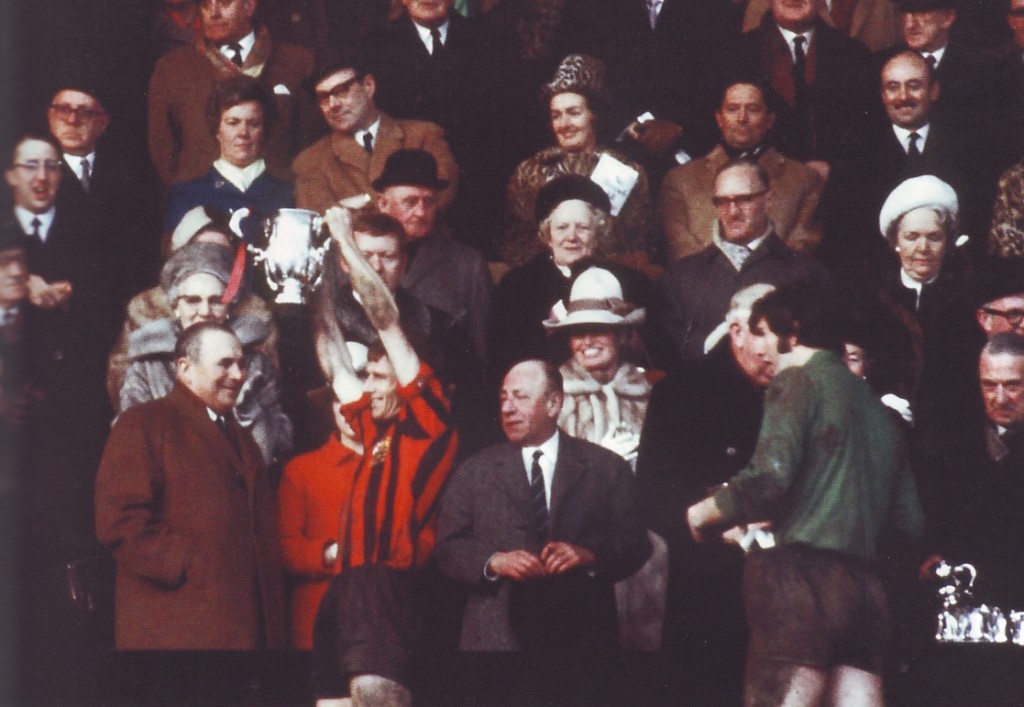
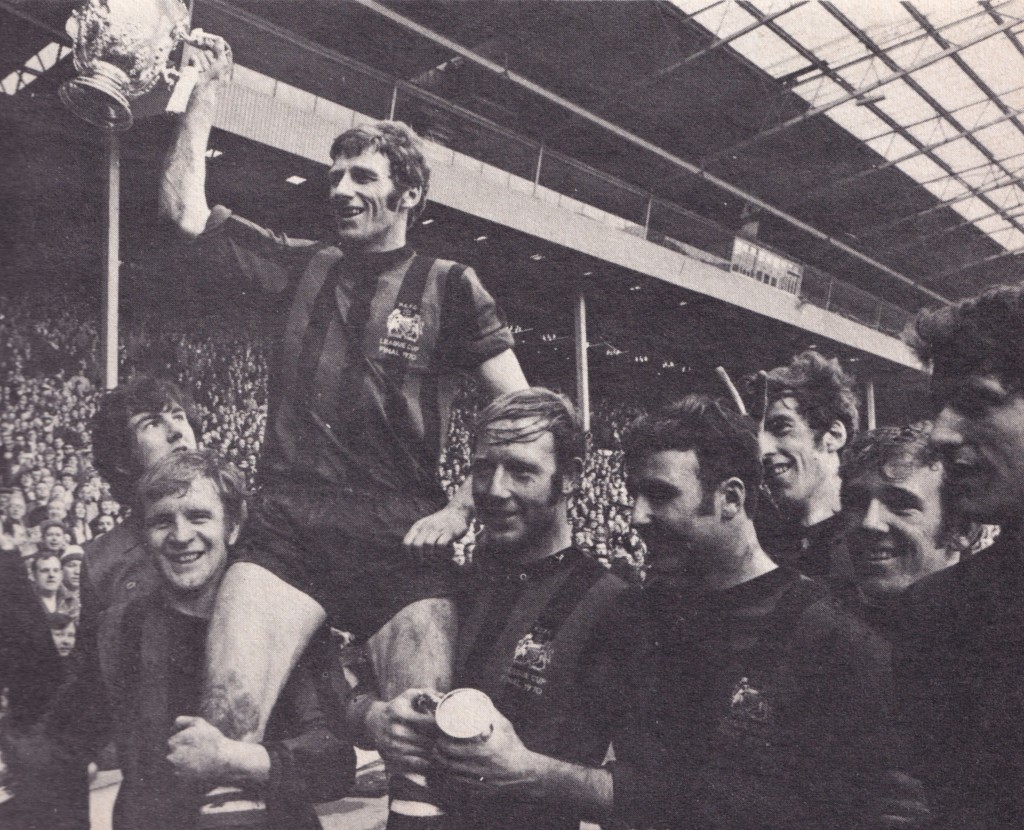
So I set of down the tunnel towards the pitch, I could feel something tangible as I neared the mouth, some say it’s like a curtain that can make or break you, I could definitely feel something. I walked out to the centre circle and it was no more than a muddy, sticky, cow patch, “A pig of a pitch” as Joe Mercer aptly described it afterwards.
It was, I believe,the day after the Horse of The Year Show, could you imagine the fuss if that was even suggested today? Football then wasn’t the dominant force it is nowadays and we just had to put up with it. The lush green turf you dreamt of as a kid was gone and my shoes were caked in mud after the first couple of steps. I tried to absorb the atmosphere of the half empty stadium before making my way back towards the tunnel.
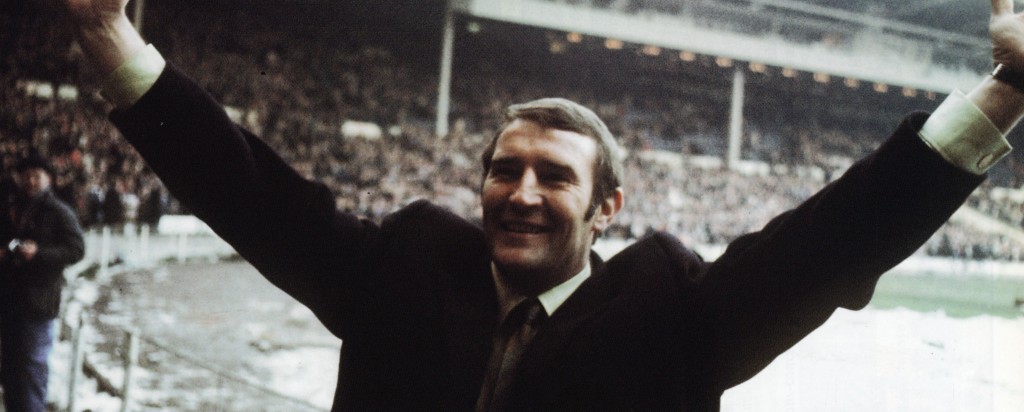

…I went into the dressing room to rejoin the lads, Malcolm was there and asked if I was alright, I nodded and he said “I just wanted you to do that on your own”. After five minutes of the match, I knew why. Jeff Astle rose to head the ball home for the opening goal. Trailing to one of the best cup sides of that era, we had the proverbial mountain to climb, but at least we had the players to deal with the situation.

Tony Book as ever, was the first to try and build my confidence up and he helped me through the game until we found our feet and eventually pulled a hard fought win in extra-time thanks to goals from Mike Doyle and Glyn Pardoe.

In sending me out on to the pitch before kick off Malcolm was trying to help me overcome the awe that Wembley induces in players. It meant I was able to handle setbacks and remain on an even keel, and that was exactly the way it panned out.
FROM THE JOE CORRIGAN STORY

